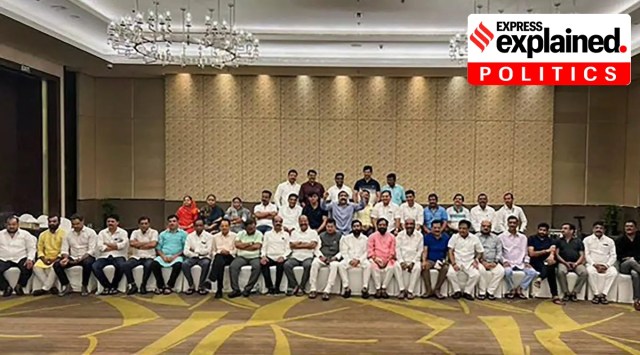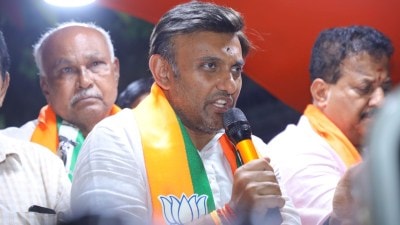- India
- International
Explained: What is the 2/3rds rule in anti-defection law?
Under the anti-defection law, a member of a legislature can be disqualified if he or she has voluntarily given up membership of their political party; and if he/she votes or abstains from voting in the House contrary to any direction issued by their party.
 Shiv Sena MLA Eknath Shinde with 42 other MLAs at a hotel, in Guwahati. (Photo: PTI, file)
Shiv Sena MLA Eknath Shinde with 42 other MLAs at a hotel, in Guwahati. (Photo: PTI, file)The political crisis in Maharashtra has given rise to the question whether the Shiv Sena rebels can avoid disqualification under the anti-defection law.
Law and exception
Under the anti-defection law, a member of a legislature can be disqualified if he or she has voluntarily given up membership of their political party; and if he/she votes or abstains from voting in the House contrary to any direction issued by their party (or by any person or authority authorised by the party).
There is a provision to protect such legislators from disqualification. If two-thirds of the members agree to a merger with another party, they will not be disqualified. Under the 91st Amendment to the Constitution in 2003, the exemption from disqualification if one-third of the members form a separate group (the rule prior to the amendment) was removed.
How courts have ruled
In February this year, the High Court of Bombay at Goa held that 10 Congress MLAs and two two MGP MLAs, who had defected to the BJP in 2019, are exempted from disqualification and held that a merger of this group of Congress MLAs is “deemed to be a merger” of the original political party with the BJP (Girish Chodankar v Speaker, Goa Legislative Assembly).

In Rajendra Singh Rana v Swami Prasad Maurya (2007), a Constitution Bench of the Supreme Court interpreted the term “voluntarily giving up membership of a political party”, and held that “a person may be said to have voluntarily given up membership of an original party even though he or she has not tendered resignation from membership of the party” and that an inference can be drawn from conduct of the member.
The two-thirds rule
Some experts believe that even if two-thirds of legislators have broken away, they will be protected from disqualification only if they merge with another party or become a separate group in the legislature.
Senior advocate Devdatt Kamat, representing Shiv Sena, said that until the MLAs rebel camp merges with another party, disqualification under the anti-defection law will still apply to them. He said there are court judgements including in the Ravi Naik case (1994) in the Supreme Court which held this view.
Senior advocate Shrihari Aney, a former Advocate General of Maharashtra, said there are debatable positions about the anti-defection law. “Various courts have passed verdicts as per specific facts of the case and I am of the view that the Eknath Shinde faction has already crossed the two-thirds mark and thus they cannot be subjected under this law and they are protected from the anti-defection law. They are entitled to be identified as a separate group or a ‘gat’ in the house and to participate in the proceedings.”
Disqualification notices
Another issue that has arisen is whether the disqualification notices served on 16 rebel MLAs can stand the scrutiny of law. Experts said that as per the Maharashtra Legislative Assembly (Disqualification on grounds of Defection) Rules and other stipulations, the Deputy Speaker’s decision cannot be upheld.
Aney said, “In my opinion, the notices disqualifying some MLAs are void ab initio. The orders are premised on the ground that these MLAs did not attend the official meeting and did not adhere to the whip. But, a whip is limited only to the business of the legislature… Here it was for a meeting called by their president Uddhav Thackeray.”
Newsletter | Click to get the day’s best explainers in your inbox
More Explained
EXPRESS OPINION
Apr 27: Latest News
- 01
- 02
- 03
- 04
- 05










































